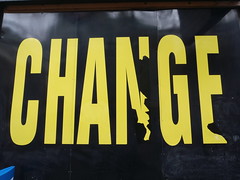 Image by busy.pochi via Flickr
Image by busy.pochi via FlickrBy Chet Sisk
I've been hearing a lot of soothsayers and visionaries talk about the coming shift in the world where everything will change. I too, see a coming shift, but instead of reading tea leaves and tarot cards, I just pay attention to the world around me. As a journalist and educator, my job is to pay attention to the developments happening throughout humanity and help make sense of those trends for emerging leaders.
Based on my observations, a significant shift in how we view ourselves and the world is definitely on the horizon. The problem we face as a society is that we are still using 20th century ideas, philosophies and concepts in a 21st century world that demands new approaches. The shift, as I see it, is a forced update that will allow our current collective wisdom to catch up with real-time experiences in the 21st century. Allow me to share with you some of the most obvious markers of shifting that I've noticed in the world.
Internet access for everyone
I've travelled around the world and have noticed that wherever I've been (save the Kalahari Desert) everyone had some kind of connection to the internet. Whether through their smart phones or their wi-fi, we are living in an age where most of the world has access to information. For the first time in the history of humanity, the majority of people do not have to live in ignorance. As with the so-called "Arab Spring", people don't have to accept the official word of the government if they feel it is inconsistent with their experiences or wishes. They can get information and challenge those ideas. Even more, this world-wide access means another benchmark: for the first time in the history of the world, we have a demonstrative form of communicating with everyone, everywhere. This new reality will produce a shift in the way governments and organizations respond.
The Rise of the Peer-To-Peer Economy
Remember the 1950s model when all things happened through central organizations and corporations that controlled the ebb and flow of everything? Well, that's still going on, but the internet is providing an alternative that's emerging at lightning speed. As I've spoken about in the class on Social Entrepreneurship, peer-to-peer exchange is creating an environment where an organic neighborhood farmer in Boise, Idaho can now exchange seeds, information if not produce with an organic yam farmer in Uganda. This new form of economic development means that the world is now the marketplace for everyone. At this writing over 100 of these peer-to-peer exchange platforms have emerged around the world. Next year, that number will rise to critical mass. The winners in this process? Individuals and those who create platforms for this kind of exchange. The losers? Corporations and organizations that seek centralized control.
The emergence of Ubuntu philosophy
You can credit Bishop Desmond Tutu and Nelson Mandela for popularizing this indigenous African philosophical construct. Ubuntu philosophy's best explanation can be found when talking about the human body. The hand, foot and eye are individual and valuable parts of a person and must be honored for the specific gifts they bring. In addition, they all work together for the good of the one body because they are all connected. "I am because we are, we are because I am". Ubuntu philosophy is making its way into cultures around the world as a substitute for religious precepts that emphasized separateness, uniqueness and conflict with others. It can be argued that Ubuntu philosophy and spirituality is best suited in a world that finds itself connected through the internet, where belief barriers will be challenged as more people talk, trade and meet each other.
The Sustainability Movement
The biggest indicator that humanity is ready to take a new road forward is the exponential growth of the Sustainability or "Green" movement. Young people (who regularly communicate through the internet) recognize that the philosophical ideas of past generations to use and abuse resources for short term gratification has a direct impact on their immediate future. They realize that to hold onto those ideas would be participating in their own demise. Thus, a different way of looking at life and the world through the sustainability movement has become the rallying cry for young people everywhere. As with all major movements, it all begins with the youth.
All of these things are also creating a kind of consciousness where the ideas of egalitarianism and connectedness seems right and in order. It is similar to what happened in the US around 1900. At that time, a great portion of people still lived in the country and on farms. It seemed unthinkable that more people would live in cities. Just a few short years later, most Americans lived in cities, It seemed unthinkable that people would live on farms. This paradigm shift occurred without a bang or an event. The people then just embraced a new consciousness about life, as if it always was.
It appears that these four trends I've noted are converging at a speed that many did not anticipate. This is the
essence of what is now being called "The Shift". Some will try to dismiss these happenings as typical change that come along with every generation, but make no mistake ... we are talking about a fundamental altering in the way human beings relate to one another.
Chet W. Sisk is an author, educator and thought leader on Sustainable Society Leadership. He offers a free online course called "Sustainable Society Leadership" with the companion book "Think This/Not That: It's Time To Update Your Conventional Wisdom" at http://www.chetsisk.com.
Article Source: http://EzineArticles.com/?expert=Chet_Sisk
http://EzineArticles.com/?What-Is-The-Shift-And-How-Will-It-Affect-Our-Immediate-World?&id=6246734

No comments:
Post a Comment